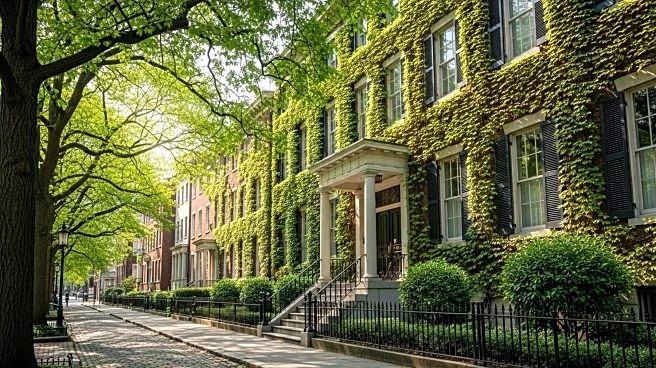What is the story about?
What's Happening?
Ivy League universities, including Harvard and Yale, possess extensive real estate portfolios that are largely tax-exempt, prompting questions about their community impact. These institutions, known for their academic prestige, have multibillion-dollar endowments and receive significant tax breaks while acquiring land for purposes beyond traditional education. The scale of their real estate investments raises concerns about who benefits from these expansions and whether they align with the universities' educational missions. Despite claims of economic benefits for local communities, a small portion of funding is allocated to student aid, with significant amounts directed toward research, administration, and institutional expenses. Controversial developments, such as Columbia University's Manhattanville campus, have sparked community tensions, prioritizing university needs over public access and welfare.
Why It's Important?
The tax-exempt status of Ivy League universities allows them to amass vast real estate portfolios without paying property taxes, which can strain local governments and affect housing affordability. This situation highlights broader challenges in balancing the tax burdens of powerful institutions with the needs of lower- and middle-income families. The debate over these universities' real estate ambitions underscores the need for a reevaluation of tax and land-use regulations to ensure greater community benefit. The implications of their tax-exempt status on local economies and housing affordability are significant, as they may contribute to increased property values and reduced availability of affordable housing options.
What's Next?
The ongoing debate surrounding Ivy League universities' real estate investments may lead to increased scrutiny and calls for policy changes. Local governments and community groups might push for reforms in tax and land-use regulations to ensure that these institutions contribute more significantly to community welfare. There could be discussions on how to balance the educational missions of these universities with their economic impact on surrounding areas. Stakeholders may explore ways to enhance transparency and accountability in how these institutions manage their real estate holdings.
Beyond the Headlines
The ethical and cultural dimensions of Ivy League universities' real estate strategies are complex, as they involve balancing institutional growth with community needs. The long-term shifts triggered by these developments could include changes in urban planning and community relations. The debate may also prompt broader discussions about the role of prestigious educational institutions in society and their responsibilities toward local communities.















